3 Essential Oils to Help Toenail Fungus
Your health has to be built on a solid foundation. That’s not just a metaphor – your body needs healthy feet in order to maintain its true potential. There are plenty of challenges that the world can throw at your feet, too. From sore feet to athlete’s foot, knowing how to overcome those issues is vital for maintaining proper wellness.
One thing that can be a serious problem is toenail fungus. While compared to most things it’s relatively harmless, the fact is that this fungus can lead to an ugly foot, unwanted odor, compromised nail growth, lower self-esteem, hesitation wearing open toed shoes, and more. And in severe cases it can lead to pain, itching, and more.
The bottom line? The swift treating of toenail fungus infection is an absolute must, and something that needs to be done as soon as the first signs of the fungus appear. Luckily, there are options out there that can help cure toenail fungus. And best of all, there are natural options as well!
Keys to Using Essential Oils for Toenail Fungus
Best Essential Oils For Fighting Nail Fungus
Now that you’ve got a clear idea on the basics of helping your fight against toenail fungus, the only thing left is to start the battle. The following essential oils are the best essential oils for fighting toenail fungus:
- Tea Tree essential oil (melaleuca alternifolia) is one of the most powerful natural antibacterial and anti-fungal essential oils out there. This is because it contains a compound known as terpenin-4-ol, which has been shown to kill fungi and prevent their spread. To use tea tree oil, start by cleaning the nail and letting it dry completely. Next, add 3 to 5 drops of the oil to a clean cotton ball, then tape it to the infected nail and allow to sit for 30 minutes to an hour. Repeat daily.
- Clove Essential Oil, renowned for its eugenol content, stands as a stalwart against fungal invasions. For those battling toenail fungus, blending clove oil with a carrier oil provides a soothing application that targets the toenail infection while guarding the skin from irritation. Integrating this treatment with the likes of tea tree essential oil, known for its terpinen-4-ol compound, can create a formidable duo against fungal threats. Apply the mixture directly to the affected nail, ensuring a generous coating to foster nail growth and combat the fungus.
- Oregano Essential Oil – This essential oil has been studied at length for its healing powers and in particular its ability to kill fungi. As such, it’s one of the go-to options for those looking to fight against fungal growth. To use oregano essential oil, place a drop or two of the oil directly onto the infected toenail and allow to sit for 10 to 20 minutes in order to allow the oil to penetrate into the infection.
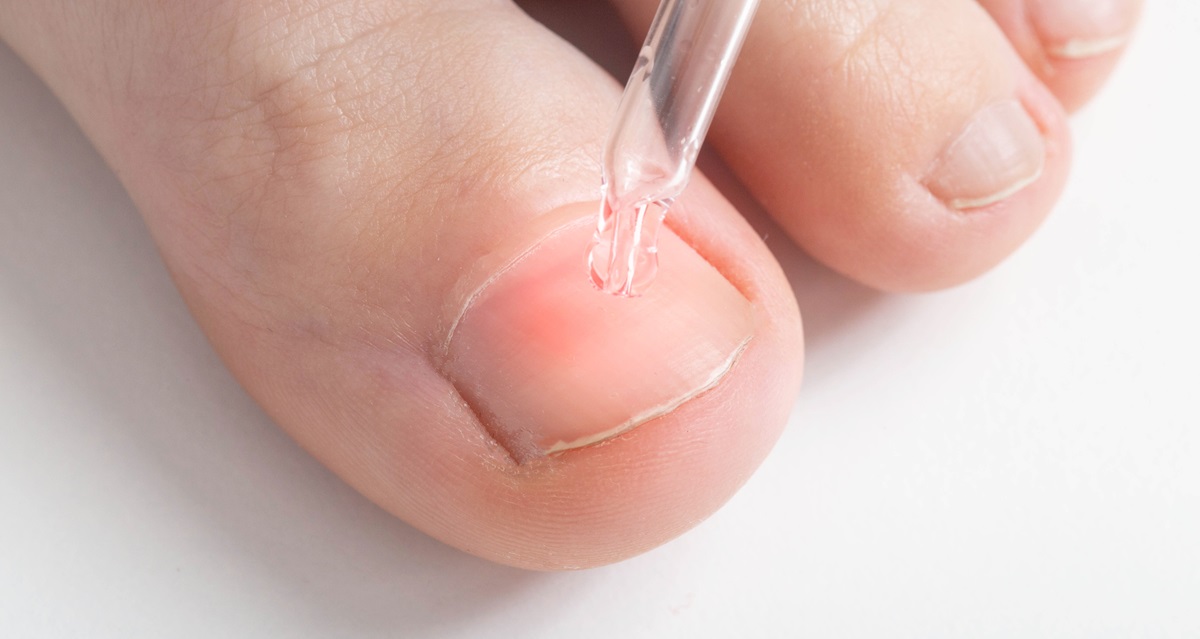
More Powerful Essential Oils for Toenail Fungus Treatment
Thyme Essential Oil (thymus vulgaris), with its rich thymol component, provides a robust defense against toenail fungus, asserting strong antibacterial and antifungal actions. Dilute thyme oil with a carrier oil to protect sensitive skin and apply to the toe nail, allowing its antiseptic properties to penetrate the affected area deeply.
Cinnamon oil – Made from cinnamon bark it is highly effective at fighting against toenail fungus thanks to the high levels of eugenol found within it. This compound kills fungus and helps prevent further infection and growth. It can be used in the same way as tea tree oil, with a cotton ball compress used daily.
For an enhanced effect, incorporate lemon essential oil or eucalyptus essential oil into your regimen.
What is Onychomycosis?
On−ih−ko−my−KOH−sis | Noun
Originating from the early 20th century Greek “onycho-” (nail) and “-mycosis” (fungal infection), this term refers to a fungal infection of the nails. It leads to discoloration, thickening, and brittleness, mainly affecting toenails.
Nature’s Fungus Fighters: The Potent Antifungal Powers of Essential Oils
| Essential Oil | Active Components | Antifungal Mechanisms |
|---|---|---|
| Tea Tree (Melaleuca alternifolia) | Terpinen-4-ol, α-terpineol | Disrupts fungal cell membranes, inhibits fungal growth and biofilm formation |
| Oregano (Origanum vulgare) | Carvacrol, thymol | Damages fungal cell walls and membranes, inhibits mycotoxin production |
| Thyme (Thymus vulgaris) | Thymol, carvacrol | Interferes with fungal cell membrane integrity, prevents fungal biofilm formation |
| Clove (Syzygium aromaticum) | Eugenol | Disrupts fungal cell membranes, inhibits spore germination and mycelial growth |
| Lavender (Lavandula angustifolia) | Linalool, linalyl acetate | Inhibits growth of fungal pathogens, reduces fungal toxin production |
Understanding Toenail Fungus
Toenail fungus, sometimes referred to as candida albicans (or even jock itch/athletes’ foot), often manifesting as discolored, thickened, and jagged nails, is a common condition typically resulting from fungi entering your nails through cracks, ragged nails, damaged skin or cuts. You are more likely to get this fungal infection if you have nail injuries, suffer from conditions like athlete’s foot or diabetes, or have a weakened immune system. Furthermore, poor blood circulation and age can increase your susceptibility.
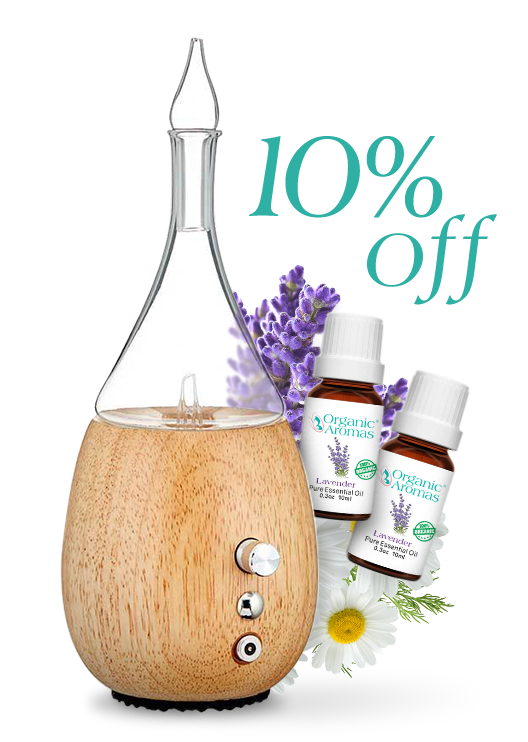
Join Now and Get a Coupon for %10 Off!
What are the Benefits of Going Natural?
There are plenty of reasons that trying a natural essential oil treatment for nail fungus makes sense:
Of course, talking to a medical professional is always important when you notice changes to the health of your feet. But if it’s determined that a fungus is present and not some larger underlying condition, essential oils could be worth thinking about.
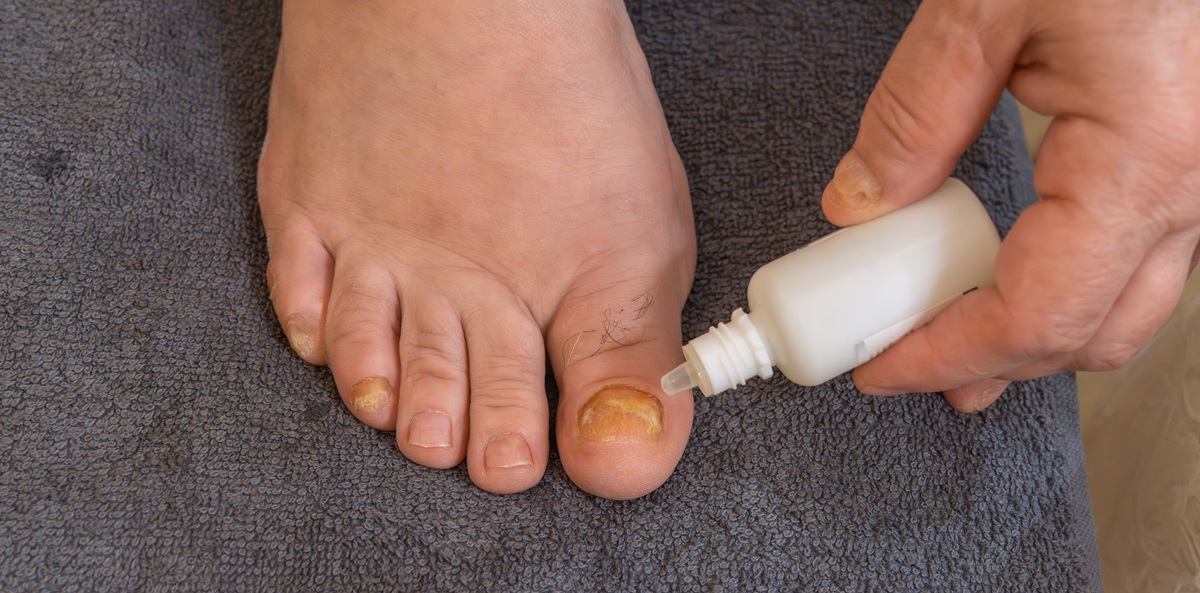
Precautions Before Using Essential Oils for Onychomycosis
Before diving into the use of essential oils for toenail fungus, it’s crucial that you’re aware of some important precautions to take for safe and effective treatment. High-quality, organic, and so-called therapeutic grade essential oils, known for their antifungal properties, are your best bet.
Safety First
Firstly, never apply essential oils directly to your skin undiluted. They’re potent and can lead to skin irritation. Always dilute them with carrier oils like almond or coconut oil. This not only reduces the chance of irritation but also helps your skin absorb the essential oils more effectively.
Additionally, you probably want to avoid using essential oils on nail polish as it may impact the quality. Moreover, restricting the treatment to the affected area and avoid contacting the eyes or mucous membranes is a must.
Next, always conduct a patch test before applying to the affected area. Avoid high doses by applying a small amount on an unaffected part of your skin and wait for 24 hours to see if any negative reactions occur.
If you’re pregnant or breastfeeding, it’s best to consult your healthcare provider before using essential oils. And remember, if you experience any adverse reactions, discontinue use immediately and seek medical advice.
Essential Oil Recipe for Toenail Fungus
To create an effective home remedy for toenail fungus using essential oils, you’ll need a blend of oils known for their antifungal and healing properties. Here’s a simple, yet potent, DIY essential oil recipe you can prepare and use at home.
This is a highly effective recipe you can use to treat your toenail fungus. Follow these steps and arrange these materials to easily and cheaply make a useful natural home remedy for your onychomycosis.
Total Time: 20 minutes
-
Mix the Oils:
In a small bowl, combine all the essential oils with the carrier oil. Mixing essential oils with a carrier oil is crucial to dilute the potent essential oils, making them safe for skin application and helping to prevent irritation, especially for those with sensitive skin.
-
Application:
Before applying the oil blend, ensure that the affected toenail and surrounding area are clean and dry. Using a cotton swab or a clean brush, gently apply a small amount of the oil mixture directly onto the affected toenail, covering the entire nails’ surface and the skin around it.
-
Let it Absorb:
Allow the oil blend to penetrate the affected area by leaving it on for at least 20-30 minutes. For optimal results, do not rinse the area immediately; instead, let the oils work their magic for as long as possible.
-
Repeat Daily:
For the best results, be patient and apply this essential oil blend to the affected toenail at least once a day, preferably at bedtime to allow extended contact time overnight. Consistency is key, as toenail fungus can be stubborn, and improvement might take a few weeks to become noticeable.
Estimated Cost: 10 USD
Supply:
- 10 drops of Tea Tree Essential Oil
- 8 drops of Lavender Essential Oil
- 5 drops of Clove Essential Oil
- 5 drops of Oregano Essential Oil
- 5 drops of Thyme Essential Oil
- 2 tablespoons of a Carrier Oil (such as coconut oil or olive oil)
Tools:
- Small bowl
- Glass bottle, roller or dropper
- Wooden, metal or glass stirrer
- Funnel
- Cotton swab/Clean brush
Materials: Essential oils, Carrier oil, Container
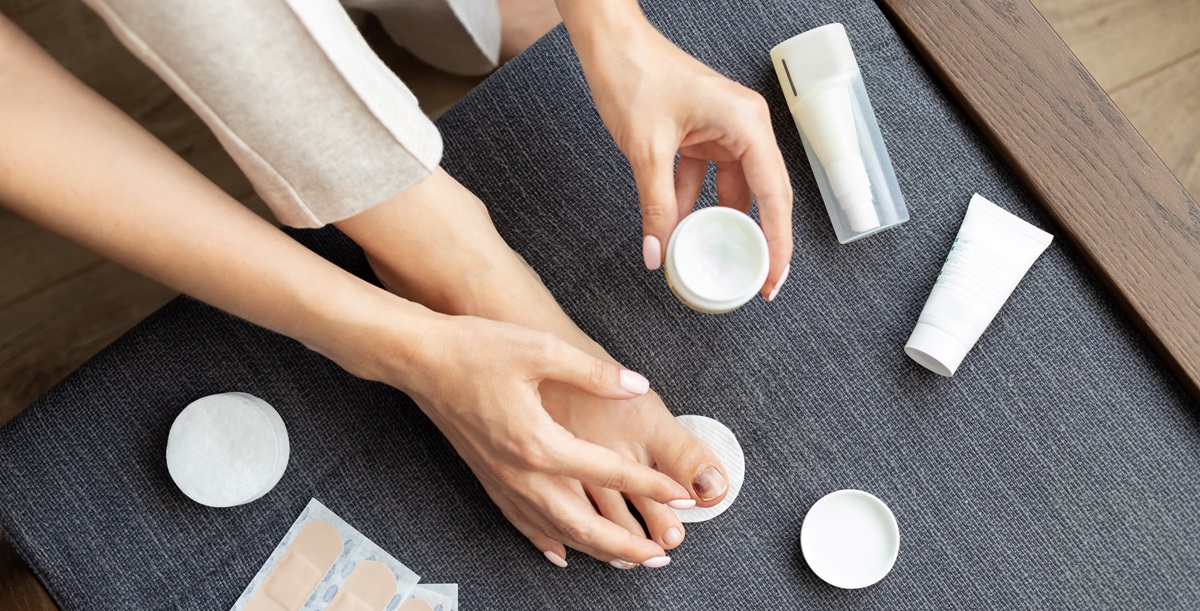
Natural Ways to Help Toenail Fungus
It’s important to note that essential oils should only be one part of your treatment plan. Toenail fungus thrives in dark, damp places and as a result it is important to take some additional steps that will help you get even more from this type of treatment.
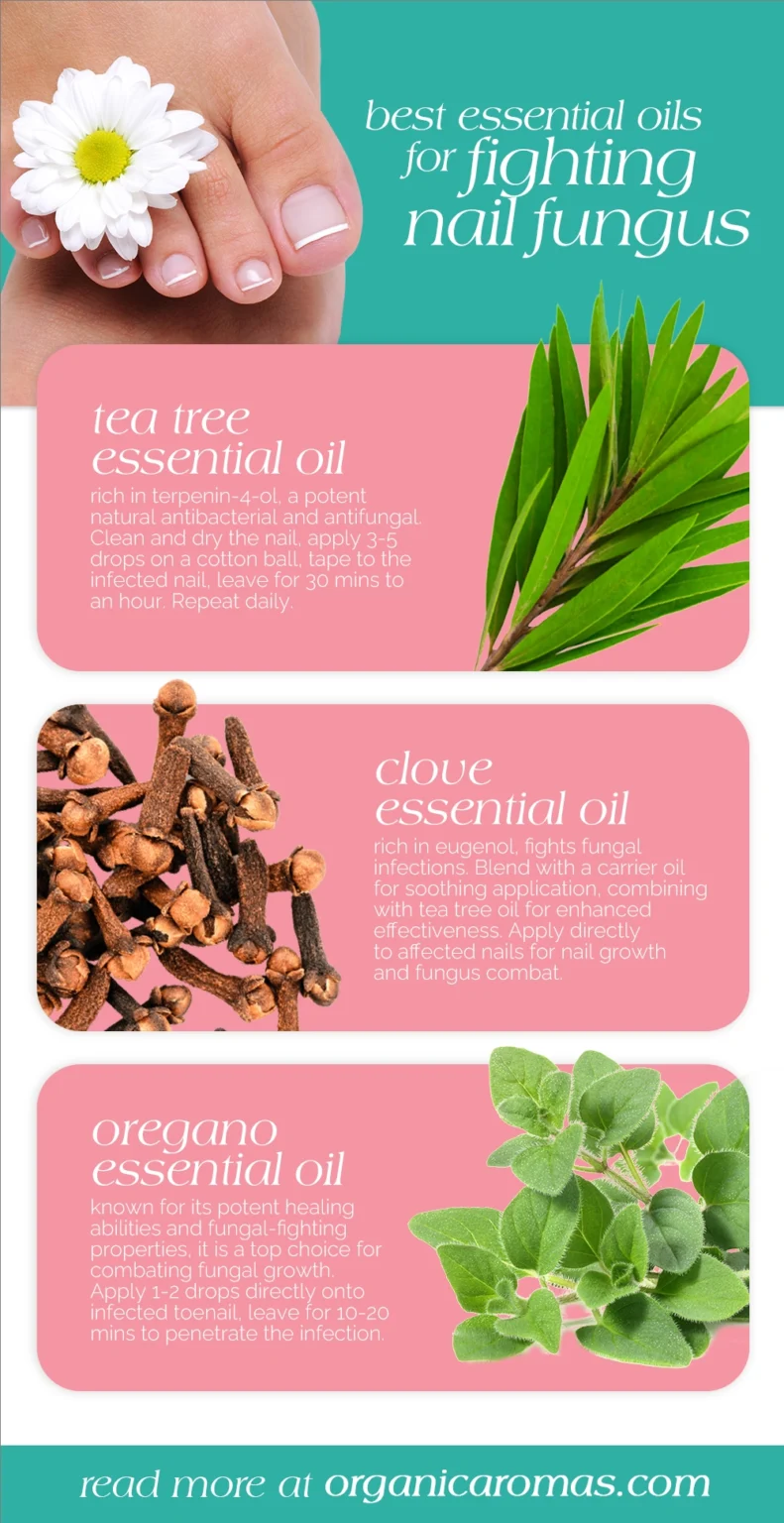
Recognizing When to Seek Professional Help
Despite your best efforts with essential oils, it’s crucial to recognize when you need professional help for your toenail fungal infections. Even with their potent antifungal capabilities, essential oils may not always be sufficient in the treatment of toenail fungus.
Here are four signs that indicate it’s time to get professional help:
1. Your symptoms are persisting or worsening despite consistent use of essential oils.
2. The fungus appears to be spreading beyond your toenails to other parts of your foot, or even to your hands or other body parts.
3. You’re experiencing severe pain or discomfort, which could signal a severe or deep-seated infection.
4. Your toenails become so thick or distorted that they’re causing difficulty with walking or wearing shoes.
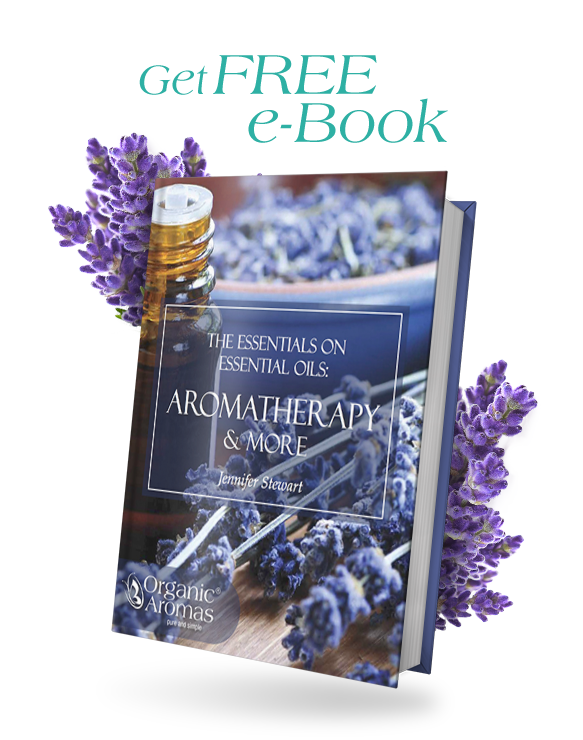
Sign Up to Get Your FREE
e-Book Here…
What Doctors and Dermatologists Prescribe for Toe Nail Fungus?
If you aren’t ready to try a natural treatment some commonly prescribed medications to treat toenail fungus include:
Tips for Preventing Nail Fungus From Returning after Treatment has been Completed
There are a few things you can do to help prevent nail fungus from returning after treatment has been completed. First, make sure to keep your nails clean and dry. Avoid going barefoot in public places, and always wear shoes or sandals when you’re outside. Secondly, don’t share nail clippers or other personal items with others. Finally, if you have diabetes or another condition that compromises your immune system, be sure to monitor your feet closely and see a doctor at the first sign of any problem.
Frequently Asked Questions

Join Our Exclusive Member Club to get Big Discounts!
Which Essential Oil Kills Toenail Fungus?
Oils like tea tree, oregano, and thyme oil have shown antifungal properties. However, always dilute them and do a patch test before full application to avoid reactions.
Which Essential Oil Is the Strongest Antifungal?
In your quest for a strong antifungal, clove essential oil emerges as a potent knight. It’s been scientifically proven to be highly effective against toenail fungus, symbolizing a natural shield against this common ailment.
What Kills Toenail Fungus the Fastest?
You’re looking for a quick fix to toenail fungus. Tea tree, oregano, thyme, peppermint and lemongrass essential oil can help. They’ve got antifungal properties to combat it. Always test and dilute before usage, and stop if reactions occur.
Is Apple Cider Vinegar or Tea Tree Oil Better for Toenail Fungus?
Tea tree triumphs in tackling toenail fungus. Its potent antifungal properties outperform apple cider vinegar, especially in severe cases. However, always test it first, and dilute it properly to avoid any potential skin irritation.

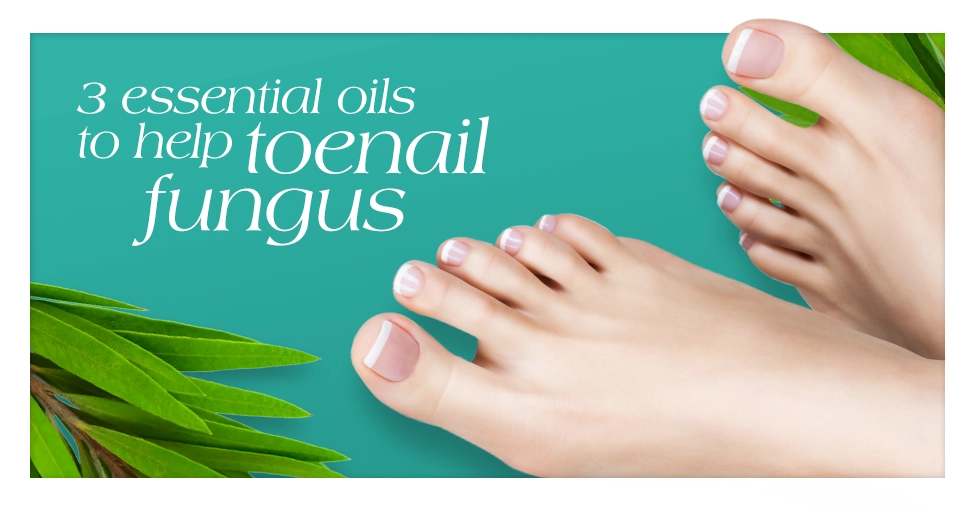
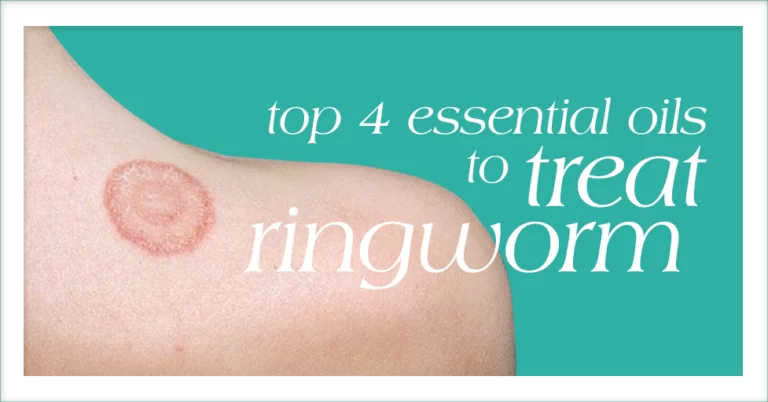
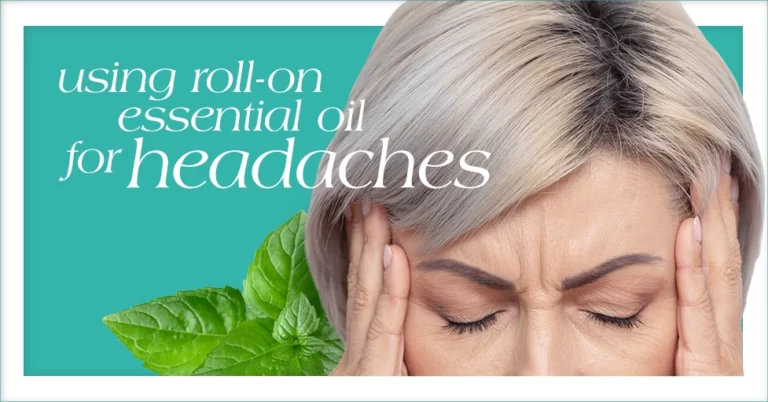
Oregano is not recommended topically at all by Lawless or Battaglia. It is considered a strong dermal irritant and a dermal toxin. You can find this info in The Complete Guide to Aromatherapy by Salvatore Battaglia pg 455 & 456. I would advise using safer oils such as tea tree or eucalyptus.
Should I put the 3 essential oils (Tea Tree, Cinnamon and Oregano) on my toenail(s) at the same time or separately and spaced? Should I mix the essential oil(s) with a carrier oil like maybe just a plain basic cooking olive oil and how much of each oil? I have also read that I should file my toenails down as much as possible before applying the Essential Oil(s).
Do I put these 3 Essential oils (Oregano, Tea Tree, and Cinnamon) on my toenail at the same time? Do or should I add or mix these 3 Essential Oils to a another or carrier? Oil like plain cooking olive oil? I know I should clean my feet daily and my nails should be reasonably dry when applying the Essential Oils. It is probably a good idea to cut and file my nails as low as possible – correct???
Could I put a few drops of tea tree, oregeno and cinnamon oil together with a teaspoon of olive oil and then apply? If so, for how long and do I wash off with soap and water afterwards and dry or leave residue on nails?
Not clear on that.
Thanks for suggesting oregano and tea tree oils. I suffer from high blood pressure so I wonder if it is advisable to use oregano essential oil.
Do not use cinnamon oil without putting it on a carrier (coconut oil works) – it can create a huge reaction when using it without diluting it.
I used Oregano oil full strength for about 6 months. It seemed to be effective but then my skin on much of the toes and bottom of my foot as well as the arch and top of the foot became inflamed and the skin began to peel and crack deeply. I stopped the oil and have been treating the dermal trauma with anti bacterial creams and the skin is beginning to heal. The nail fungus seems to be in remission and the nail seems to be growing back. The dermal problem has been going on for about 4 weeks now.
Enjoyed reading the article above , really explains everything in detail,the article is very interesting and effective.Thank you and good luck for the upcoming articles
I thought oregano was a hot essential oil and that you had to be careful with it.??are you sure it will not burn in the toenails?
Dont you need to dilute these oils with coconut oil or something? or can you apply them to the nail bed directly?
Thinking about using the tea tree oil and oregano on my son’s feet to treat nails. Would it be effective to apply the oregano directly to the nail bed and make a salve with tea tree oil and coconut oil to apply to the feet?
I have heard about tea tree and oregano oil for fungus but not cinnamon. Great to know!
As much as i love cinnamon and the benefits internally i didn’t think of the benefits it had externally on fungus great article write up.
??
We have had experience with Tea Tree Oil getting rid of toenail fungus that even prescription meds didn’t touch, but I had no idea of the other two. Thanks for the great information!
Very Informative! I dealt with toenail fungus and used coconut oil and tea tree which really helped. I had to be consistent with it to achieve a beneficial effect. Thanks for sharing other solutions to cure toenail fungus.
Love that tea tree, it sure is a versatile oil, cinnamon and oregano make sense too when dealing with fungal infections. Thanks for all of the ways to use them.
Wonderful information. 🙂
lot of great information I don’t have that problem thank goodness
The article is informational, I knew about tea tree oil but I had no clue about oregano or cinnamon oil. Live the pic, too funny with the mushrooms,
I’ve only ever thought of tea tree essential oil in DIY masks. Amazing that it can treat so many other issues!
interesting article
Fungus on 2nd toe on each foot refuses to respond to over-the-counter remedies. I need to try this!
It is amazing to learn how essential oils can be used to cure and help so many health issues.
wow ineteresting blog of how to treat toe nail fungus using essiential pils instead of chemicals.
I would love to win this awesome contest!
Thanks for another informative article.
Honestly I find it amazing that essential oils can help with even things like fungus.
Jen, I think they are referring to how the cinnamon oil is made – from the bark – and to use the oil itself directly on the site of the infected area.
I love using my oils topically whenever possible! Why go to the store when I can use my oils at home for a fraction of the cost?
More helpful tips. Thank you. Xx
Thank you for this information! I have a son who plays football….any suggestions on using the oils in his shoes as preventative?
Love to have one of these. I usually use only the ultrasonic ones. 🙂
I never imagined that Cinnamon would be used in this way. Your blogs are so informative, and I have learned alot from reading it.
Are you saying to use the cinnamon bark or cinnamon leaf? Each have their own dermal max, along with the oregano. So be mindful of that.
I had no idea that essential oils could help cure things like toe fungus- I always went with the whole aromatherapy aspect!